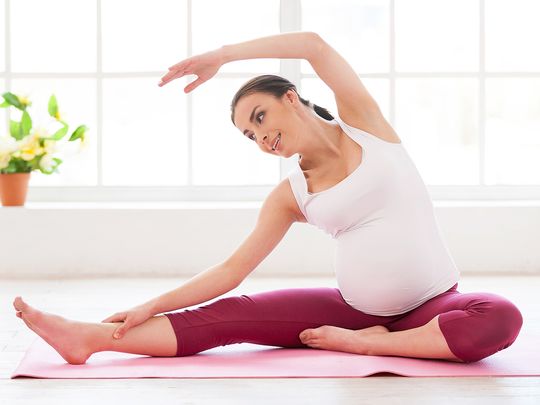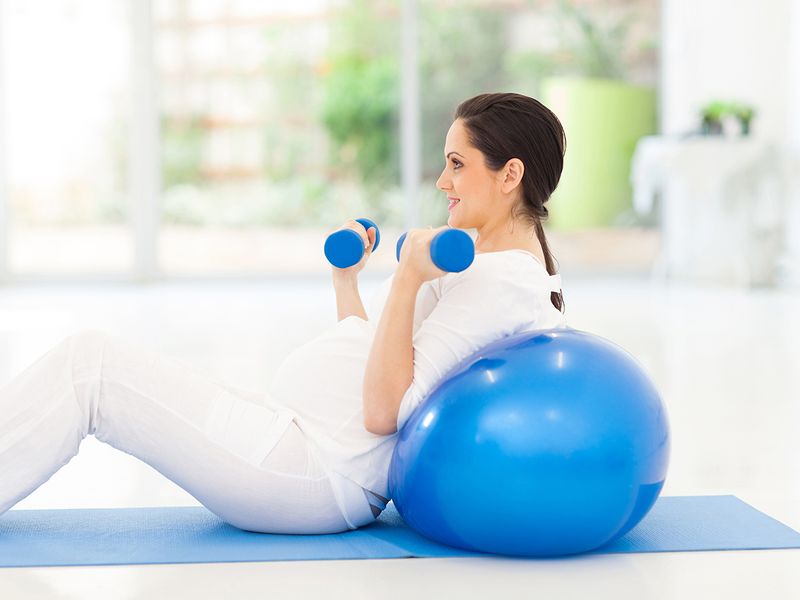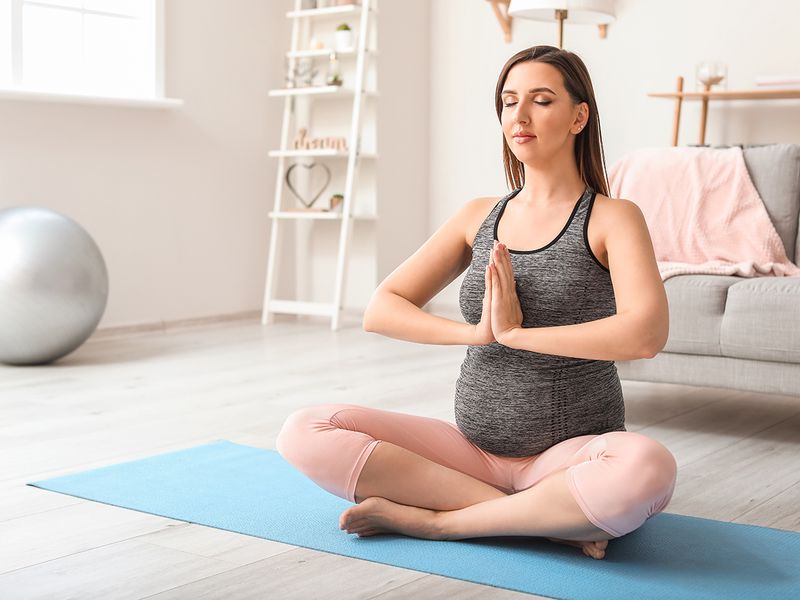
Pregnancy: A beautiful journey filled with wonder, but also its fair share of challenges. Backaches, fatigue, and constant health anxieties can leave you feeling drained. Luckily, there's a secret weapon waiting to combat these woes: Low-resistance training. Think of it as your personal energy refueling station!
It’s a natural mood elevator as fitness experts explain. It helps in reducing the stress levels, boost your mood, and moreover, keep your body strong, as Nora Hameidani, the founder and creative director at Barre Effect, Dubai explains. “It protects the body from injury and illness, maintains a healthy weight and assists in adequate sleep,” she adds. These are crucial factors that assume paramount importance during pregnancy, and exercising has been proved enormously beneficial to the mother’s physical abilities, comfort and energy.

Don't keep thinking about your weight. So, generally, the rule is whatever you are doing beforehand, if you’re used to it and conditioned for it, then you can continue with that. You need to focus on staying strong, as the stronger you are, the easier your pregnancy should be...
Don’t keep thinking about your weight, warns Sarah Lindsay, an American expat, the co-founder of Roar Fitness, Dubai. “So, generally, the rule is whatever you are doing beforehand, if you’re used to it and conditioned for it, then you can continue with that,” she says. “You need to focus on staying strong, as the stronger you are, the easier your pregnancy should be, the easier giving birth should be, and the easier your recovery time afterwards should be,” adds Lindsay, emphasising the importance of fitness during pregnancy. However, don’t be too surprised when you see that you might have to tone down the intensity of your workouts, owing to the changes happening in your body.
Why pregnant women need to stay fit

Ditch the weights and skip the high-impact routines. The good thing? It might just keep your blues at bay.
During pregnancy, turning to low-resistance training is your best option. Swimming, yoga, pilates are all gentle on your joints and limit the opportunity for injury, explains Hameidani. If you’re in class, the moves should be modified to adapt to different stages of pregnancy, whether pre, during or post. So, be sure to consult your doctors on what type of movement is best during pregnancy.
As you can face fatigue and weakness during pregnancy, staying fit does reduce the symptoms by increasing the muscle strength and endurance, says Mridula Singh, a Dubai-based specialist obstetrician and gynaecologist. It gives your strength and stamina a considerable boost, and can help prepare your body for the gruelling demands of labour and delivery.
Beating the blues with workouts
As women are more susceptible to depression during pregnancy, sustained and careful workouts can elevate the mood, she adds. A 2012 study titled Aerobic exercise training during pregnancy reduces depressive symptoms in nulliparous women: a randomised trial, published in the US-based National Library of Medicine, showed that workouts during pregnancy can help improve your mood. “There’s a significant reduction in stress and anxiety in women who do work out during pregnancy,” says Singh.
And, these fitness exercises can keep a stern check on your blood pressure. While blood pressure fluctuations are normal during pregnancy, a sudden rise might be a red flag for complications in the pregnancy like pre-eclampsia. “Staying active, even if it just means going on regular walks, can stop your blood pressure from rising,” adds Singh. Of course, staying fit also means easing your back pain that can be aggravated during pregnancy.
During a regular pregnancy you can start working out anytime. However, if you are facing headaches, pain, constipation, chest pain, calf pain, or muscle weakness, you need to clarify with your doctor before trying anything.
The fitness tips you need to keep in mind:
Know your limits and try not to compare yourself to others. Everyone’s got a different journey, so don’t try to do what others do.
Work at trying to keep active on a daily basis, say experts. A daily 30-minute walk can be quite enough, but even if you can’t manage that, some movement is still better than nothing. You can even opt for swimming, as water will support your increasing weight too.
According to Singh, walking provides a cardiovascular workout and doesn’t impact the knees and ankles. However, be careful of where you walk, she advises: Choose smoother surfaces, and use supportive footwear. Be wary of bumps and potholes on the roads.
The joys of swimming
Water always helps! There’s a relief in swimming, as it does not strain the neck, shoulders or back muscles. Avoid diving, or jumping, which could hurt the abdomen.
Do not try to be a daredevil and attempt sports where you risk being hit, such as kickboxing, judo or squash, the experts advise. Skiing, or horse-riding, in short anything where you risk falling, is also a flat no.
Mild aerobics
No, I’m not talking about gravity-defying moves and high-flying leaps, but a little mild aerobics can really help during pregnancy, according to Lindsay. It helps to tone your muscles, power your muscles and lungs and make you feel strong and supported
Yoga

Priya Matthews, a Sharjah fitness yoga instructor and teacher, teaches yoga to pregnant women. Explaining the benefits of yoga for them, “It actually helps them a lot, in terms of strengthening muscles, stimulating blood circulation, maintaining a healthy blood pressure and increasing flexibility.”
However, she and Singh advise: As the pregnancy progresses, avoid poses that could lead to lying on the abdomen, or lying on your back. If you lie on your back, the bump can put pressure on the major veins and arteries and decrease blood flow to the heart. This reduced blood flow can lead to dizziness.

There is a higher chance of becoming dizzy, when you are pregnant, so take care especially when transitioning from up or down from the ground. You are more likely to overheat when pregnant, so again, listening to your body, taking breaks, and having adequate hydration are key...
Start slowly, and then gradually build up speed
Hameidani advises to start slowly, and then gradually increase your speed during low-resistance workouts. “There is a higher chance of becoming dizzy, when you are pregnant, so take care especially when transitioning from up or down from the ground,” she says.
Moreover, your balance and stability can be off when pregnant, so move with control to prevent falling or tripping. There is a fluctuation of hormonal changes that happen when a woman is pregnant, and some of them lead to the drop in blood pressure that make you dizzy, says Hameidani. “You are more likely to overheat when pregnant, so again, listening to your body, taking breaks, and having adequate hydration are key,” she says.
What you should avoid during pregnancy, according to Singh
• Avoid working out in excessively humid environments. Make sure that you stay hydrated throughout the day and ensure you work out in a temperature-controlled room.
• Do not do exercises while lying on your back; it puts pressure from your growing uterus on a vein that returns blood to the heart.
• Do not try any abdominal crunches








